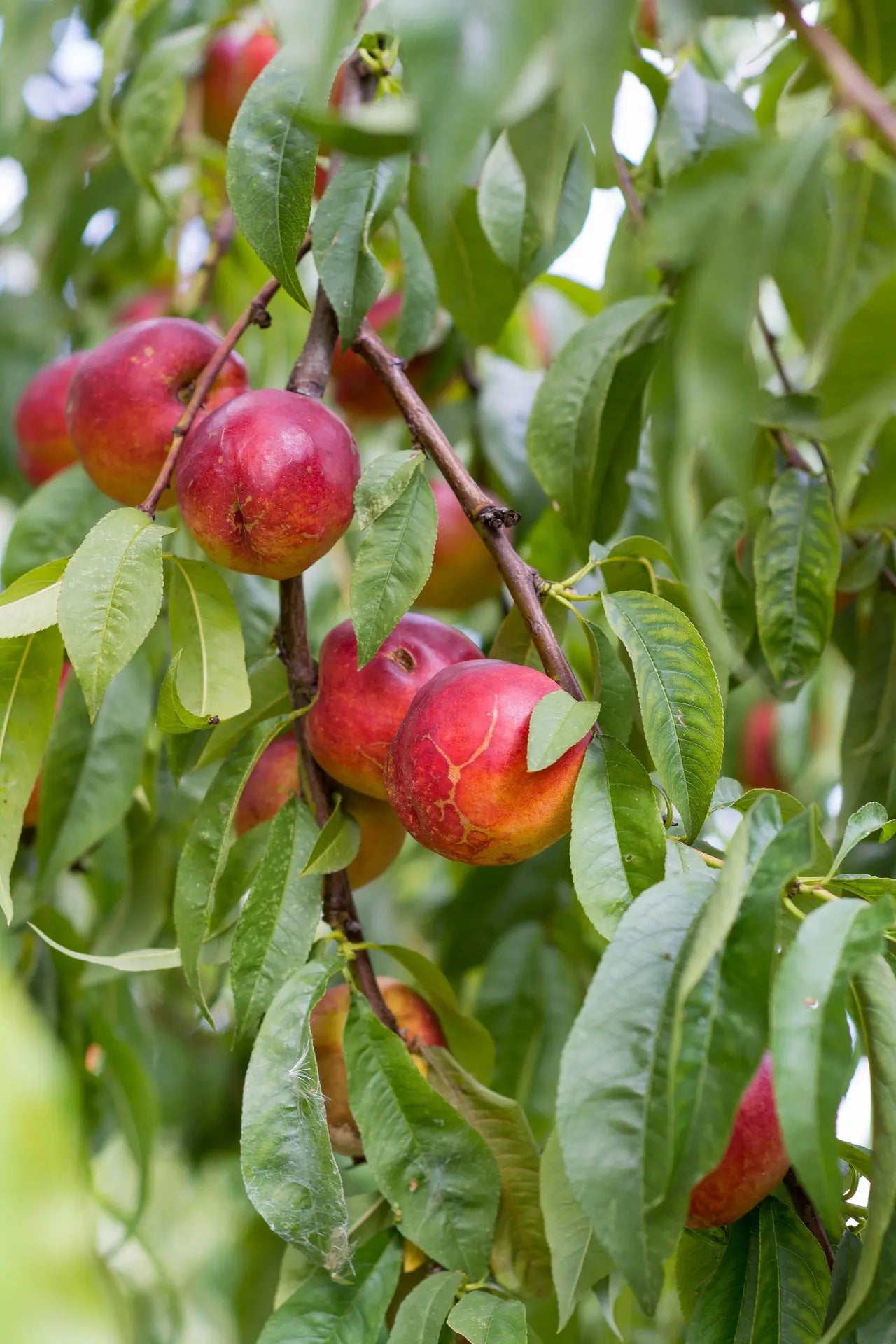-
Delivery from 10 plants to France, Switzerland and Europe
Delivery method -
Fruit Tree Wholesale Supplier
About Us -
Quality Fruit Tree Plants
Technical itinerary
John Rivers Nectarine Half-Standard Tree 6-8 cm diameter bare-root
John Rivers Nectarine Half-Standard Tree 6-8 cm diameter bare-root
The prices shown are our base prices for large volumes. Depending on the quantity ordered and the producers’ pricing scales, the rate may be adjusted upward. Each quote is personalized to ensure you receive a fair price.
Mini order 10 units / Multiple orders 10 units (FRS202412002)
Couldn't load pickup availability
 Buy now and get it delivered when you're ready to plant - Add your desired date to your quote request
Buy now and get it delivered when you're ready to plant - Add your desired date to your quote request
- Delivery from 10 plants to France, Switzerland and Europe

John Rivers Nectarine Variety Fact Sheet
- Fruit flesh color: White, juicy, fragrant and deliciously sweet.
- Skin color: Very red.
- Size and shape: Medium sized, rounded fruits.
- Tree size: 4-5 meters in height and 3-4 meters in width at maturity.
- Fruit maturity: End of July and beginning of August.
- Fruit Taste: Fragrant, delicately sweet, with juicy, fragrant white flesh.
- Earliness of the variety: Early.
- Fruiting period: End of July until August.
- Disease Resistance and Storage: Fruits can be preserved by syrup or canning, in a cool, dry environment to maximize their shelf life.
- Variety yield: Very vigorous and productive.
- Self-fertile? Yes, it is self-fertile, but cross-pollination can improve fruit quality and quantity.
-
Commercial use:
- Direct consumption.
- Processing into jam, syrup and preserves.
-
Comments:
- Native to Asia, particularly Mongolia.
- Adapts to all types of soil (neutral, rich or calcareous).
- Requires maximum sun to ripen in the best conditions.
- It is best to plant it sheltered from the wind and cover it with a good winter fleece to protect it from severe frost.
Quick read / the essentials on the John Rivers Nectarine Tree
The John Rivers nectarine tree is an old and precious variety, highly appreciated by arboriculturists for its precocity and the exceptional taste quality of its fruits. Its white, juicy and sweet flesh , combined with an intense red skin, makes it an ideal nectarine for fresh consumption and processing. Adapted to temperate climates and resistant to -18°C , it naturally finds its place in French orchards. Arboriverse, a specialist wholesale supplier of nectarine plants , provides growers with plants selected for their vigor and productivity.
If you are looking to buy John Rivers nectarine plants , you should know that this variety is distinguished by its spreading habit and rapid fruiting , usually in the third or fourth year. Its self-fertility allows production without the need for pollinators, although association with other nectarine trees improves yield. Its early harvest from the end of July is an asset for producers looking to position themselves at the start of the season.
As a specialist wholesale supplier of nectarine plants , Arboriverse offers robust plants perfectly adapted to French growing conditions. The John Rivers nectarine tree thrives in well-drained, rich, slightly acidic soils , while moderately tolerant of chalky soils. Full sun exposure is essential to ensure good fruiting and sweet nectarines. Despite good drought tolerance once mature, moderate irrigation is recommended in summer to optimize fruit quality.
If you are considering buying John Rivers nectarine plants , Arboriverse can assist you with technical advice and a wide selection of suitable rootstocks, such as GF677 and Krymsk 1 , which guarantee good resistance to calcareous and dry soils . Its strong commercial potential and reputation for taste make it a strategic choice for growers looking for a high-yielding, early-maturing variety.
Introducing the John Rivers Nectarine Tree for Professional Arborists in France
The John Rivers nectarine tree is an old and valuable variety, particularly appreciated for the taste quality of its fruits and its precocity. Native to Asia, particularly Mongolia, it has adapted to European climates and is distinguished by its hardiness and good tolerance to varied conditions. Its moderate development and spreading tree-like habit make it a productive tree and suitable for cultivation in professional orchards.
Fruit characteristics: a sweet and fragrant white nectarine
John Rivers produces medium-sized fruits with deep red skin and juicy, fragrant white flesh. Their flavor is delicately sweet, making it a sought-after variety for fresh consumption.
Harvesting takes place at the end of July , with a relatively short fruiting period of about two weeks. To ensure optimal quality, these nectarines should be consumed quickly or stored in a cool, dry place. They can also be made into jams or canned.
A vigorous and productive tree
This fruit tree can reach 4 to 5 meters in height and 3 to 4 meters in width at maturity. It is characterized by great vigor and a spreading habit , which facilitates its access for maintenance and harvesting.
Thanks to its high productivity, it can offer an interesting yield, although precise data on the quantity harvested per tree are not specified. Its fruiting is relatively rapid, with the first production possible after three to four years of planting.
Unlike some varieties that require cross-pollination, John Rivers is self-fertile . However, the presence of other nectarine trees can improve the quality and abundance of production.
Adaptability to climate and growing conditions
The John Rivers nectarine tree is suitable for a wide variety of climates, including continental, maritime, mountain, and Mediterranean . It can withstand winter temperatures as low as -18°C , but frost protection is recommended in areas with harsh winters.
It particularly appreciates well-drained, rich, and slightly acidic to neutral soils . Although it tolerates calcareous soils, a pH that is too high can harm its development. A sunny location is essential to ensure good fruit ripening.
Regarding irrigation, it tolerates heat and drought well once mature , but requires regular watering during its first three years of growth to establish itself well. Moderate irrigation in summer can be beneficial to ensure quality fruit.
Resistance to diseases and pests
Like many nectarine trees, John Rivers is susceptible to certain fungal diseases , including bacterial leaf spot and peach leaf curl . Careful monitoring and preventive application of Bordeaux mixture treatments at the end of winter can limit their impact.
Classic nectarine pests, such as aphids and thrips, may also be present. Biological control or the use of appropriate treatments may be considered to protect production.
Recommended cultural practices and rootstocks
Growing the John Rivers nectarine tree requires regular maintenance and proper fertilization. Annual pruning is recommended to renew the fruit wood, promote fruiting, and improve air circulation within the tree.
Applying nitrogen-rich fertilizers in the spring promotes vegetative growth, while potassium supplements in the fall help enhance fruit set. Using ground horn or fish meal can also improve tree vigor.
The choice of rootstock plays a crucial role in adapting this variety to French soil conditions. Although specific data on its compatibility are not detailed, rootstocks such as GF677 or Krymsk 1 are generally used for nectarine trees grown in France, ensuring good adaptation to calcareous and dry soils.
Economic potential and marketing
The John Rivers nectarine tree represents a certain economic interest for producers thanks to its precocity , its taste quality and its capacity to adapt to different climates .
This variety is primarily intended for fresh consumption , offering consumers a fragrant and sweet white nectarine. It is also well suited to processing , particularly into jams, syrups and preserves .
Although exact yield information is not specified, its high productivity and rapid fruit set make it an attractive choice for growers looking to diversify their offerings and meet the growing demand for white-fleshed nectarines.
Conclusion: a variety suitable for demanding producers
The John Rivers nectarine tree is a valuable variety for French orchardists, combining precocity, taste quality and climatic adaptability . Its self-fertility, vigor and ability to tolerate varied soils make it a viable option for professional orchards.
However, its susceptibility to disease requires rigorous crop management to ensure optimal yields. With balanced fertilization, careful maintenance, and preventative treatments, this variety can offer regular and profitable production, perfectly suited to the French nectarine market.
To summarize: Nectarine John Rivers
The John Rivers nectarine tree is a choice variety for growers looking for an early, sweet nectarine . Its fragrant white-fleshed fruits with intense red skin are harvested from the end of July, offering a product appreciated by the market for fresh consumption and processing. Thanks to its adaptability to French climates and its good hardiness , it represents a profitable investment for orchards. Arboriverse, a specialist wholesale supplier of nectarine plants , selects high-quality plants to ensure optimal production.
If you want to buy John Rivers nectarine plants , it is essential to provide suitable growing conditions: well-drained soil, sunny exposure and controlled irrigation during dry periods. This variety, although cold tolerant down to -18°C , may require protection against late frosts in sensitive areas. Its spreading tree-like habit facilitates orchard management and harvesting, allowing rapid fruit set 3 to 4 years after planting.
Thanks to Arboriverse, a specialist wholesale supplier of nectarine plants , arboriculturists have options adapted to their needs, notably with rootstocks such as GF677 or Krymsk 1 , which improve resistance to dry and calcareous soils . Annual pruning and balanced fertilization with a potassium supply in the fall ensure optimal yields.
Investing in the John Rivers nectarine tree means choosing a profitable and sought-after variety on the market . Its self-fertility and exceptional taste quality make it a strategic choice for producers wishing to diversify their offer with an early-available and tasty nectarine. To buy John Rivers nectarine plants , trust Arboriverse , your expert partner in high-performance fruit plants.
-
John Rivers Nectarine Scion bare-root organic
Regular price €13,85 EURRegular priceUnit price / per -
John Rivers Nectarine Scion bare-root
Regular price €10,55 EURRegular priceUnit price / per -
John Rivers Nectarine Half-Standard Tree 8-10 cm diameter bare-root
Regular price €24,50 EURRegular priceUnit price / per -
John Rivers Nectarine Half-Standard Tree 6-8 cm diameter bare-root
Regular price €22,90 EURRegular priceUnit price / per -
John Rivers Nectarine Half-Standard Tree 10-12 cm diameter bare-root
Regular price €26,00 EURRegular priceUnit price / per



